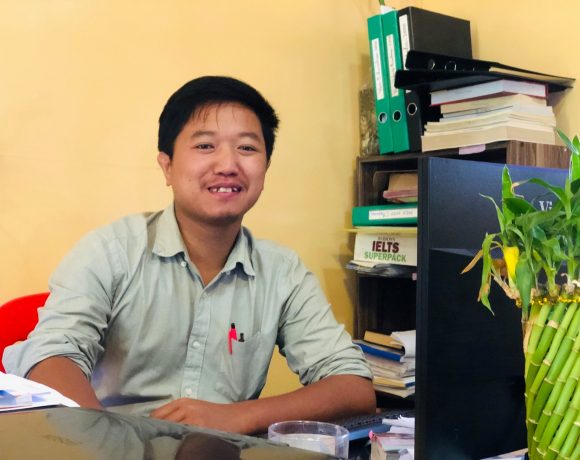Interview With Gen. Aung Than Lay of Kareni National Progressive Party (KNPP)
Lawkhila: November 16, 2002
Chinland Guardian: General, thank you for sparing us some of your time.
Gen. Aung Than Lay: You are very welcome.
Chinland Guardian: Would you please give us a brief account of your revolutionary history? When did you join Kareni National Peoples Party (KNPP)? Gen. Aung Than Lay: I joined the Kareni resistance movement in
October 1948, shortly after the invasion of Kareni State by the soldiers of the Anti Fascist Freedom League (AFPL) on 9 August 1948. I joined the KNPP in 1966 as an ordinary member and also as a normal warrior when I first joined resistance movement. In 1966, while serving in the Kareni resistance movements as in-charge of a squadron, I was also elected a member of the Central Committee. Later in 1976 I was appointed the military Commander-in-Chief of the Kareni Army (KA)
which I stayed until 1977. In 1977, I was elected Vice-Chairman of the KA, and I have continuously held this position to this date while currently I also hold the position of the Prime Minister in the Kareni government.
Chinland Guardian: We have learned that an agreement between the KNPP and the SPDC failed recently after a ceasefire agreement had been entered into. Could you tell us more about this?
Gen. Aung Than Lay: Certainly. There was no signed agreement
between the SPDC and the KNPP. Any agreement there was was at the level of a gentlemen’s agreement, requiring the parties not to disturb each other’s internal affairs. However, when the SPDC decided to start seizing Kareni stations and thereby reneged on this agreement a clash between the parties ensued which endures to this day.
Chinland Guardian: We have heard that the KNPP has dissociated itself from the National Democratic Front (NDF). Could you please tell us why this development came about and whether you have any interest in rejoining the NDF?
Gen. Aung Than Lay: Yes, I think it would be best to explain first the reason why we joined the NDF before telling you why we withdrew our membership from NDF. KNPP is not a founding member of the NDF. It became a member later. The reason for associating with the NDF was on the basis of its constitution which read that a party could join and quit from the NDF with independent freedom. As we liked this article of their constitution, we were willing to be associated NDF.
However in 1988, since the NDF failed to stand on its constitution and became a member of Democratic Alliance of Burma (DAB), the KNPP split from the NDF. This is the root cause for the KNPP quitting our membership of the NDF. The question of whether or not we are
interested in rejoining the NDF lies on how much its constitution would be made amendable. I have seen no way for the KNPP to again become a part of the NDF if the present constitution remains.
Chinland Guardian: In the present political scenario in Burma, as you are aware, the term ‘tripartite dialogue’ enjoys great popularity. What is your view on it?
Gen. Aung Than Lay: Well, I would like to explain the Karenis’ viewpoint with regard to this very popular term, “tripartite dialogue”, at this juncture. As we explicitly underlined in our statement No.1 of 2000, the oppressed nationalities would form one force which would be involved in this historic political dialogue. In addition to taking this position, we have a strong inclination to work towards the coming into existence of this coalition.
Chinland Guardian: We have learnt that the KNPP participated in the 5th Congress of NDF as a special invitee. Did the KNPP have a chance to present suggestions or proposal with regards to its position on some key issues?
Gen. Aung Than Lay: The Kareni government has submitted its proposal in the course of the fifth general conference of the NDF. The suggestion is to reform the NDF based on nation-states, not on political parties which is the currenty practice.
Chinland Guardian: Do you have any other thing that you would like to say?
Gen. Aung Than Lay: Yes, I would like to address the issue of child
soldiers, which so many people talk about today. There are two reasons for this phenomenon. Firstly, today’s battles being fought by the oppressed are all about national liberation. There is no neutral position. Secondly, today the order and policy of the SPDC under which military operations are launched is to set all houses on fire, to demolish all foodstuffs and to annihilate even human beings.
Because of this brutal policy came carried out by the SPDC, even elderly men and teenagers rise up in defense of themselves.
(Note: This interview was conducted by Salai Bawi Lian Mang at Camp Lawkhila during the 5th National Democratic Front NDF congress and translated by Salai Za Ceu Lian from original Burmese version)






